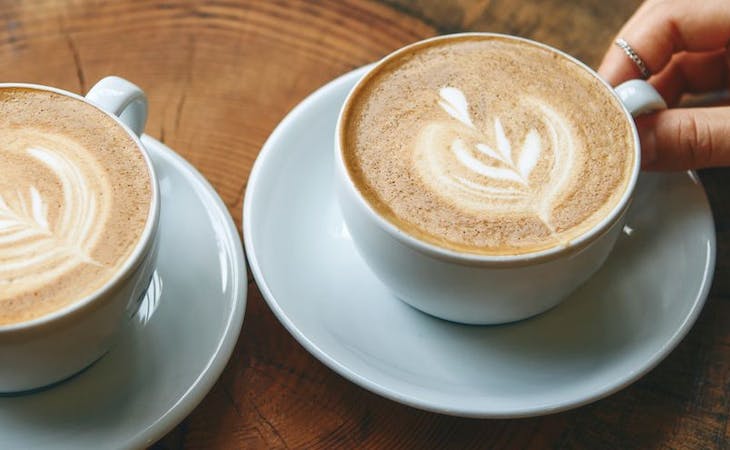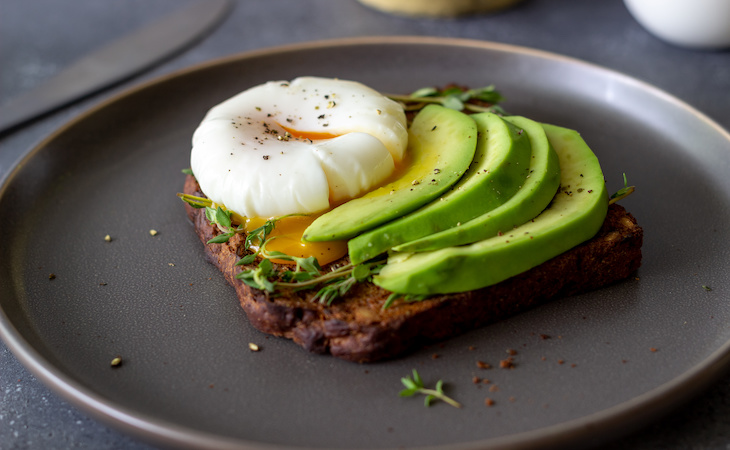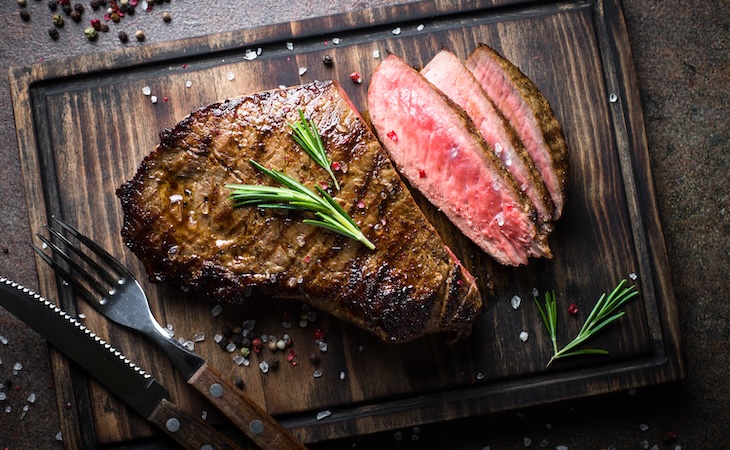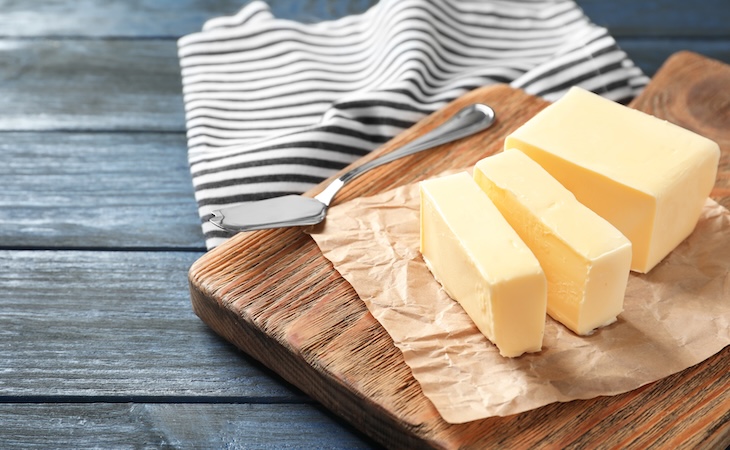Whether it’s a venti iced almond latte or a steaming mug of green tea, about 85% of Americans consume at least one caffeinated beverage per day, according to a January 2014 study from Food and Chemical Toxicology. So if you’re like most people, you likely start your day with some coffee—and maybe you even enjoy a 3 p.m. pick-me-up to beat the afternoon slump. While caffeine has many great benefits, including reducing the risk of type 2 diabetes and heart disease, at one time or another many of us have experienced one big downside.
“Caffeine is a stimulant that can have a negative impact on your ability to sleep,” says Bonnie Taub-Dix, RDN, creator of BetterThanDieting.com and author of Read It Before You Eat It: Taking You from Label to Table. “In general, for some people, caffeine helps them feel more awake, but for others, it makes them feel jittery and wired.”
How, exactly, does caffeine affect your body—and how do you know whether your latte habit is to blame for those sleepless nights? Here, experts explain the complex relationship between caffeine and sleep.
How much caffeine is too much?
The Food and Drug Administration (FDA) recommends no more than 400 milligrams of caffeine a day. A cup of coffee, for example, has about 96 milligrams of caffeine, according to the Mayo Clinic. The National Sleep Foundation (NSF) says three 8-ounce cups of coffee, which have about 250 milligrams of caffeine in total, is a moderate amount.
But the reality is, there isn’t an exact daily recommended amount of caffeine. “When it comes to caffeine, you have to know yourself to get a handle on your particular tolerances,” Taub-Dix says. Many factors, such as body weight, health conditions, and medications you’re taking, will help you determine how much is too much caffeine.
Michael J. Breus, PhD, clinical psychologist, diplomat of the American Board of Sleep Medicine, and fellow of The American Academy of Sleep Medicine, says it’s most important to pay attention to the amount of caffeine and the time of day you’re consuming it. “I recommend stopping caffeine consumption at 2 p.m.,” he says. “If you’re an afternoon caffeine drinker, switch to decaf at 2 p.m. If you like a post-dinner cup of coffee, consider swapping that out for tea.”
Breus explains that you should limit caffeine consumption to early in the day due to its lasting effects. “Caffeine has a long half-life, between six to eight hours,” he says. “That means it can take up to eight hours for half of the caffeine to be metabolized by the body. A 2 p.m. cut-off helps ensure you’re able to fall asleep by 10:30 p.m.”
Think your caffeine habit might be affecting your sleep? Here are some signs you should limit your intake.
1. You’re having trouble falling asleep
Caffeine is an adenosine receptor antagonist. Adenosine is a neurochemical that’s responsible for promoting sleep. Throughout the day, adenosine levels build up in the brain, but caffeine, by binding to its receptors, diminishes adenosine’s effects.
“Caffeine impacts sleep primarily by blocking adenosine,” explains Michael Grandner, PhD, director of the Sleep and Health Research Program at the University of Arizona. “Caffeine consumed too close to bedtime can make a person more likely to have difficulty falling asleep or maintaining adequate deep sleep. For most people, this window is about four to six hours but can be up to 10 to 12 hours in some people.”
A September 2015 study in Science Transitional Medicine suggests that enjoying caffeine in the evening can delay your bedtime by as much as 40 minutes. That’s because caffeine also delays the onset of melatonin production. Breus says that caffeine has a stronger influence on melatonin suppression than bright light. “This is another example of how caffeine affects your sleep-wake cycle,” he says. (Learn about coffee naps and whether they can help you sleep.)
2. You’re waking up in the middle of the night
Research shows that caffeine can also affect deep sleep. FYI, there are four stages of sleep. The first stage is the lightest form of sleep, in which your eye movements slow down but you’re still somewhat alert. Stage two sleep happens when your brain produces brain waves called sleep spindles. Stages three and four are essentially deep sleep, where your body repairs muscles, boosts your immune system and builds energy for the next day. February 2017 research published in Sleep Medicine Reviews shows that caffeine can reduce slow-wave sleep, which is the deepest phase of non-rapid eye movement (NREM) sleep.
Moreover, because caffeine naturally increases your heart rate and adrenaline, it can make you more restless at night. Not to mention, caffeine is a diuretic so it can cause you to wake up in the middle of the night to pee.
Related: 9 reasons you keep waking up in the middle of the night
3. You’re staying up late and binge eating
While caffeine temporarily suppresses your appetite and promotes thermogenesis, which is the process your body undergoes to generate heat and energy, it can lead to weight gain because you’re sleep-deprived.
“If caffeine is the culprit causing restless nights, you could end up gaining weight for a few reasons, including hormonal changes that impact appetite, feeling apathetic about your desire to have more control over your intake, and hoping eating will give you energy to stay awake,” Taub-Dix explains.
Like kryptonite, not getting enough snooze time can lower your willpower to make healthy food choices. An August 2013 study in Nature Communications demonstrates how sleep-deprivation alters appetite-regulating hormones and causes us to make unhealthy food choices. Researchers showed 23 participants 80 food images of high- and low-calorie meals. Participants were awarded the meals they craved the most according to their MRI scans. Researchers found that those who got less sleep craved higher-calorie foods than those who were well-rested.
The bottom line is that caffeine isn’t a substitute for sleep: “When you need to sleep you need sleep, not caffeine,” Taub-Dix says. Moreover, some coffee and energy drinks can be high in calories and sugar, so consuming too many of them can also cause you to pack on the pounds. “Cream, syrups, and sugars can turn a healthy beverage into a calorie- and fat-laden one,” Taub-Dix says. If you’re enjoying coffee, for instance, stick to low-fat milk or unsweetened dairy-free milk and avoid using syrups, sugar, whipped cream, and other calorie-dense toppings.
4. Your anxiety symptoms have become worse
For some people, one too many cups of joe can mean more than just a small case of the jitters. “The alerting effects of caffeine might increase anxiety in that it increases heart rate, muscle tension, and other physiologic signals that could overlap with anxiety,” Grandner says. Studies show that caffeine can have some anxiety-inducing effects itself. In a May 2003 study in Neuropsychopharmacology, which surveyed 100 healthy caffeine users, participants reported increased feelings of anxiety and had higher heart rates and blood pressure.
5. You have frequent headaches
You might feel a nice energy boost after loading up on caffeine in your system, but consuming a lot of it can cause something called caffeine rebound, aka caffeine withdrawal, which can make for an unrestful night. According to the National Headache Foundation (NHF), a caffeine rebound happens as a result of someone withdrawing from caffeine after consistently consuming large amounts of it—and that includes pain-relieving medications with caffeine.
“The effect of caffeine on headaches is due to the fact that caffeine narrows blood vessels—a process called vasoconstriction—and then the vessels relax, causing vasodilation. This sudden expanding of blood vessels can cause headaches,” Grandner says. “And withdrawal from caffeine can also affect blood vessels, which can also cause headaches. These effects should wear off once the caffeine effects wear off.”
If you’re prone to headaches and migraines, the NHF says it’s wise to err on the safe side and avoid caffeine. An August 2019 study in The American Journal of Medicine surveyed 101 adults with episodic migraines and asked them to report their daily caffeinated beverage intake. Researchers found a higher incidence of migraines on days when people consumed caffeinated beverages versus on days they didn’t.
Still, the research linking caffeine and headaches remains largely unclear, as the amount of caffeine consumed that causes headaches hasn’t been widely studied. But if you want to play it safe (and get a good night’s sleep), limit caffeine as much as possible, especially if you’re prone to headaches.
Related: What happens to your body when you don’t get enough sleep
6. You have nausea and an upset stomach
Another reason caffeine might be keeping you up at night is that it can stimulate your gastrointestinal tract. “For some people, caffeine causes an upset, jittery stomach, and in some cases, this problem comes with diarrhea and discomfort,” Taub-Dix says. “This uncomfortable feeling can also be a disruptor of a good night’s sleep.” That’s because coffee, for example, contains acids that can irritate your stomach lining. “There are several effects of caffeine on the digestive system, including increasing stomach acid release, increased reflux, and muscle movements in the large intestine,” Grandner says. (Here’s what you need to know about caffeine gummies.)
How to reduce your caffeine intake for better sleep
Be mindful that certain foods and other beverages also contain caffeine—it’s not just your java habit you need to keep in check. Taub-Dix says tea, chocolate, soda, energy drinks, pre-workout sports drinks, and even medicines and supplements are other sources of caffeine. So while you may only have one cup of coffee in the morning, you might be consuming more caffeine than you realize.
To help you reduce your caffeine intake, Taub-Dix recommends enjoying half-decaf coffee with half-regular coffee. “Slowly change the ratios to wean off of the caffeine altogether,” she says.
Looking to sip on something soothing before bed? These are the best teas for a good night’s sleep.




